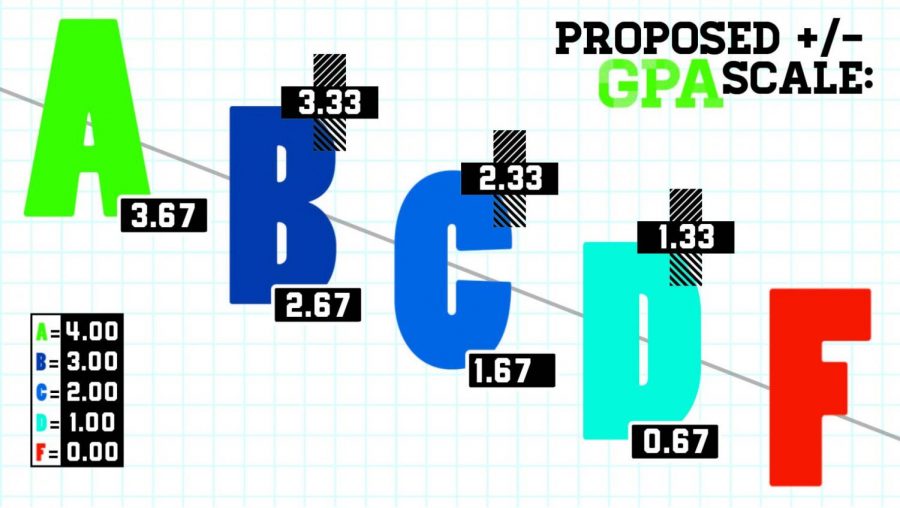Plus/minus grading system tabled, vote expected in February
It seems that students and faculty at St. Edward’s University are at odds over the plus/minus grading system.
A recent survey put out by the Student Government Association shows that 24 percent of students are in favor of a plus/minus grading system, while the faculty survey reported that 59 percent of faculty members are for the currently proposed system.
The survey also showed that 67 percent of the faculty members are in favor of some sort of plus/minus system, although maybe not the specific system that has been proposed. Seventy percent of faculty members who took the survey reported that they would use the new grading system if it was implemented.
St. Edward’s is one of six liberal arts universities in Texas that does not currently use a plus/minus system. The other nine liberal arts schools in Texas, such as St. Mary’s University, have a plus/minus grading scale.
The university’s Academic Council met on Monday to discuss the results of the surveys but decided not to vote on the issue until next semester.
SGA Sen. Jonathan Edwards reported to the council about the student survey results, first mentioning that the data of 620 responses was skewed and had to be adjusted for students who took the survey more than once or who did not provide their email.
“Most of the animosity is from the school of natural sciences students,” Edwards said.
Out of 347 total responses, 119 came from students in the natural sciences.
These students wrote that the new system would only hurt their grades, claiming that it is already difficult enough to get an A in a biology course, for example.
One senior biology major who is opposed to the change wrote on the survey that they transferred to St. Edward’s because the school did not have the plus/minus system. The student claimed that transferring to St. Edward’s changed their GPA from a 2.9 to a 3.5.
Other responses in opposition of the new system claimed that change in grading policy would put too much of an emphasis on grades and not enough on learning.
Some students responded that the system should be implemented, but proposed a grandfather clause.
“It should be phased in gradually with incoming freshman,” a student wrote. “Most entered the school with the idea that this wasn’t a thing. It isn’t right to change the grading system in the middle of people’s current four year term.”
Students who marked that they were unsure about the proposed system wrote that they did not have enough information about the system or that they were worried how it would affect upperclassmen whose grades have been recorded under the previous system.
“I just want to make sure the registrar will mark that we did half under regular, and half under the new system,” an unsure student wrote.
Eighty-four of the 347 surveys verified, responded in favor of the plus/minus system. Many wrote that the new system would provide more clarity for understanding grades and more accurate representation of a student’s work. Students also wrote that it would make the university more competitive and would look better when applying for graduate or professional school.
“It only matters if the faculty can discern the different levels and if the students can understand that level of granularity,” a student in favor of the system wrote. “Ask them to write a self reflection essay at the end of the semester and see if they can express those small incremental steps.”
The majority of faculty who took the survey are in favor of implementing a plus/minus system, although there is not unanimous agreement on the mechanics of the proposed system.
“For cryin’ out loud, please move us to this scale,” Hilltop Views and journalism professor Jena Heath wrote. “It will make our students more competitive graduate school applicants and raise our standards generally.”
Faculty members who are opposed to the plus/minus system cite concerns of an increase in students appealing grades and in grade inflation.
“I fail to see the reason for this,” one faculty member wrote. “It is impossible in most situations to discriminate between an A+, A, A-. This will just invite more students pleading at semester’s end.”
Professors who are in favor or neutral about the possible policy change are questioning how the plus/minus scale would work for a C grade or below.
Other faculty members wrote that they are confused whether an A and an A+ letter grade will equate to the same numeric GPA or not.
Faculty members are also not in unanimous agreement about mandatory implementation of the system.
The council has asked the committee that is working on the new grading system to examine these three points before the council take any vote.
The Academic Council is scheduled to vote on the grading system on Feb. 2, 2015, but the Board of Trustees will still need to approve the decision before it is implemented.







